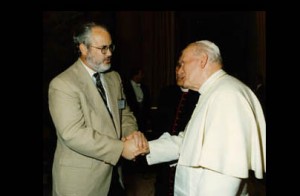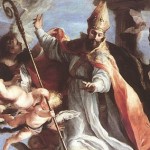The Friday After Epiphany – from the Gospel of Luke the full reading and reflection
“Great multitudes gathered to hear and to be healed of their infirmities“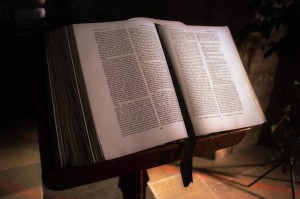
an excerpt from today’s reflection by Don Schwager:
The leper who met Jesus did something quite remarkable. He approached Jesus confidently and humbly, expecting that Jesus could and would heal him. Normally a leper would be stoned or at least warded off if he tried to come near a rabbi. Jesus not only grants the man his request, but he demonstrates the personal love, compassion, and tenderness of God in his physical touch. The medical knowledge of his day would have regarded such contact as grave risk for incurring infection. Jesus met the man’s misery with compassion and tender kindness. He communicated the love and mercy of God in a sign that spoke more eloquently than words. He touched the man and made him clean – not only physically but spiritually as well.
Some eleven centuries later, another man, named Francis, met a leper on the road as he journeyed towards Assisi. “Though the leper caused him no small disgust and horror, he nonetheless, got off the horse and prepared to kiss the leper. But when the leper put out his hand as though to receive something, he received money along with a kiss” (from the Life of St. Francis by Thomas of Celano). Francis did what seemed humanly impossible because he was filled with the love and compassion of Christ. The Holy Spirit inflames our hearts with the love of Christ that we may reach out to others with compassionate care, especially to those who have been rejected and mistreated. The love of God impels us to do as Jesus did – to love the unlovable, to touch the untouchable, and to forgive the unforgiveable. Do you allow the Holy Spirit to fill your heart with the love and compassion of Christ for others?
“May the power of your love, Lord Christ, fiery and sweet as honey, so absorb our hearts as to withdraw them from all that is under heaven. Grant that we may be ready to die for love of your love, as you died for love of our love.” (Prayer of Francis of Assisi, 13th century)
for the full reflection visit : Daily Reading and Meditation
Tags: catholic, catholic podcast, catholic prayer, cathollc spirituality, don schwager, gospel of luke
This entry was posted on Friday, January 7th, 2011 at 11:36 am
You can follow any responses to this entry through the RSS 2.0 feed.
The Thursday After Ephiphany – from the Gospel of Luke the full reading and reflection
“All wondered at the gracious words which proceeded out of Jesus’ mouth”
an excerpt from today’s reflection by Don Schwager:
How can we know and experience God’s favor and goodness towards us? In Jesus we see the grace of God in action. His gracious words brought hope, joy, and favor to those who were ready to receive him. Where did Jesus began his public ministry? In his own land of Galilee where he was reared from his youth in Nazareth. His proclamation of the fulfillment of the Messianic prophecy of Isaiah brought wonder to his kin and townsfolk. Isaiah had prophesied that the Messiah would come in the power of the Holy Spirit to bring freedom to those oppressed by sin and evil (see Isaiah 61:1-2). Jesus awakened their hope in the promises of God. They, in turn, received his words favorably and wondered what would become of “Joseph’s son”. Their hearts were hungry for the word of life and they looked to Jesus with anticipation and wonder. Do you look to Jesus with confidence and hope in the fulfillment of all God’s promises?
What did Jesus come to do for us? He came to set us free from the worst tyranny possible – slavery to sin and the fear of death, and the eternal destruction of both body and soul. God’s power alone can save us from emptiness and poverty of spirit, from confusion and error, and from hopelessness and the fear of annihilation. The gospel of salvation is “good news” for us today. Do you know the joy and freedom of the gospel?
“Lord Jesus, you are the fulfillment of all our hopes and dreams. Through the gift of your Holy Spirit you bring us grace, life, truth, and freedom. Fill me with the joy of the gospel and inflame my heart with love and zeal for your kingdom and your will for my life.”
for the full reflection visit : Daily Reading and Meditation
Tags: catholic, catholic podcast, catholic prayer, cathollc spirituality, don schwager, gospel of luke
This entry was posted on Thursday, January 6th, 2011 at 8:32 am
You can follow any responses to this entry through the RSS 2.0 feed.
The Wednesday After Epiphany – from the Gospel of Mark the full reading and reflection
“Take heart, it is I; have no fear”
an excerpt from today’s reflection by Don Schwager:
Aren’t we like the apostles when we experience trials and adversity? While the Lord may at times seem distant to us, he, nonetheless is constantly present at our side. The scriptures remind us that the Lord is “a very present help in trouble†(Psalm 46:1). Whatever storms make beset us, he promises to “bring us to our desired haven†(Psalm 107:29-30). The Lord keeps watch over us at all times, and especially in our moments of temptation and difficulty. Do you rely on the Lord for his strength and help? Jesus assures us that we have no need of fear if we trust in Him and in his great love for us. When calamities and trials threaten to overwhelm you, how do you respond? With fear and panic, or with faith and trust in God’s love and presence with you?
“Lord Jesus, may I never doubt your saving help and watchful presence, especially in times of adversity. Fortify my faith with courage and hope that I may never waver in my trust in youâ€.
for the full reflection visit : Daily Reading and Meditation
Tags: adversity, calamities, catholic, catholic podcast, catholic prayer, cathollc spirituality, don schwager, gospel of mark, temptation, trust in god
This entry was posted on Wednesday, January 5th, 2011 at 8:37 am
You can follow any responses to this entry through the RSS 2.0 feed.
The Tuesday After Ephiphany – from the Gospel of Mark the full reading and reflection
“They all ate and were satisfied”
an excerpt from today’s reflection by Don Schwager:
What is the significance of this miracle? The miraculous feeding of such a great multitude pointed to God’s provision of manna in the wilderness for the people of Israel under Moses’ leadership. This food foreshadowed the true heavenly bread which Jesus would offer his followers. The sign of the multiplication of the loaves when the Lord says the blessing, breaks and distributes through his disciples prefigures the superabundance of the unique bread of his Eucharist or Lord’s Supper. Jesus makes a claim only God can make: He is the true bread of heaven that can satisfy the deepest hunger we experience.The feeding of the five thousand shows the remarkable generosity of God and his great kindness towards us. In the multiplication of the loaves and fishes we see a sign and a symbol of what God always does. When God gives, he gives abundantly. He gives more than we need for ourselves that we may have something to share with others, especially those who lack what they need. God takes the little we have and multiplies it for the good of others. Do you trust in God’s provision for you and do you share freely with others, especially those who lack?
“Lord Jesus Christ, you satisfy the deepest longings of our hearts and you feed us with the finest of wheat (Psalm 81:16). Fill me with gratitude for your blessings and give me a generous heart that I may freely share with others what you have given to me.”
for the full reflection visit : Daily Reading and Meditation
Tags: catholic, catholic podcast, catholic prayer, cathollc spirituality, don schwager, gospel of mark, loaves and fishes, multiplication
This entry was posted on Tuesday, January 4th, 2011 at 12:19 am
You can follow any responses to this entry through the RSS 2.0 feed.
Debra Herbeck has compiled a compelling selection of reflections from sai nts and writers who have suffered, who were tempted to depair, and who were tested in everyway, but through grace and faith, they never gave up. Hope, a viture we can’t live without. If you or someone you know is suffering through hard times, “Safely Through the Storm” is for you.
nts and writers who have suffered, who were tempted to depair, and who were tested in everyway, but through grace and faith, they never gave up. Hope, a viture we can’t live without. If you or someone you know is suffering through hard times, “Safely Through the Storm” is for you.
[powerpress]
Tags: catholic, catholic podcast, catholic prayer, cathollc spirituality
This entry was posted on Monday, January 3rd, 2011 at 9:20 pm
You can follow any responses to this entry through the RSS 2.0 feed.
The Monday After Ephiphany – from the Gospel of Matthew the full reading and reflection
“The people who sat in darkness have seen a great lightâ€
an excerpt from today’s reflection by Don Schwager:
In announcing the good news, Jesus made two demands: repent and believe! Repentance requires a life-change and a transformation of heart and mind. The Holy Spirit gives us a repentant heart, a true sorrow and hatred for sin and its consequences, and a firm resolution to avoid it in the future. The Holy Spirit gives us grace to see our sin for what it is – rebellion and a rejection of the love of God. God’s grace helps us to turn away from all that would keep us from his love. Faith or belief is an entirely free gift which God makes to us. Believing is only possible by grace and the help of the Holy Spirit who moves the heart and converts it to God. The Holy Spirit opens the eyes of the mind and makes it easy for us to accept and believe the truth. To believe is to take Jesus at his word, to believe that God loved us so much that he sent his only begotten Son to redeem us from the slavery of sin and death. God made the supreme sacrifice of his Son on the cross to bring us back to himself. Do you know the love of God that surpasses all else and that impels us to give him our all? God wants to change our way of thinking and transform our lives by the power of his word.
“Lord Jesus, your ways are life and light! Let your word penetrate my heart and transform my mind that I may see your power and glory. Help me to choose your ways and to do what is pleasing to you”.
for the full reflection visit : Daily Reading and Meditation
Tags: catholic, catholic podcast, catholic prayer, cathollc spirituality, don schwager, gospel of matthew, repentance
This entry was posted on Monday, January 3rd, 2011 at 5:18 am
You can follow any responses to this entry through the RSS 2.0 feed.
 The Solemnity of the Epiphany – from the Gospel of Matthew the full reading and reflection
“They fell down and worshiped Jesus”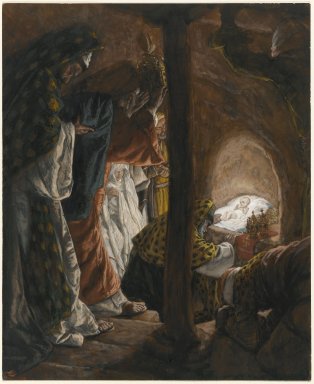
an excerpt from today’s reflection by Don Schwager:
The Lord of the universe who revealed the star of Bethlehem to the Gentiles of the East so they could come and worship Jesus, the Prince of Peace (Isaiah 9:6) and King of Kings (Revelations 19:16), gives each one of us the same light of revelation to recognize and accept Jesus as our Lord and Savior. Faith is an entirely free gift that God makes to us. It is through the help of the Holy Spirit, who moves the heart and opens the eyes of the mind, that we are able to understand, accept, and believe the truth which God has revealed to us through his Son, Jesus Christ. In faith, the human will and intellect cooperate with grace. “Believing is an act of the intellect assenting to the divine truth by command of the will moved by God through grace” (Thomas Aquinas).
To know and to encounter Jesus Christ is to know God personally. In the encounter of the wise men with Jesus we see the plan of God to give his only Son as King and Savior, not just for the Jewish people but for all the nations as well. The Lord Jesus came that both Jew and Gentile might find true and lasting peace with God. Let us pray today that Jew and Gentile alike will find the Lord and Savior on their journey of life. Do you bring the light of Jesus Christ to those you meet through the witness of your life and testimony?
“Lord Jesus Christ, we thank you for bringing salvation to all the nations. May the gospel of salvation be proclaimed to every nation today and to every person on the face of the earth. Help me to be a good witness of the joy of the gospel to all I meet.”
for the full reflection visit : Daily Reading and Meditation
Tags: catholic, catholic podcast, catholic prayer, cathollc spirituality, don schwager, gospel of matthew, magi, solemnity of the epiphany, star of bethlehem
This entry was posted on Sunday, January 2nd, 2011 at 12:05 am
You can follow any responses to this entry through the RSS 2.0 feed.
Show 13 – Artificial Reproduction Technology
The many variations “assisted” reproduction technologies, which should truly been termed “artificial”. Why is the distinction important? What are the dangers morally, as well as physically? And why has infertility increased over the years?
“Your Fertility Care Consultâ€
with Dr. Thomas Hilgers, founder of the Pope Paul VI Institute
for The Study of Human Reproduction
hosted by Kris McGregor
[powerpress]
Tags: artificial reproduction, catholic, catholic podcast, catholic prayer, cathollc spirituality, dr. thomas hilgers, fertility care, Fertility Care Consult, human reproduction, in vitro fertilization, infertility, ivf, kris mcgregor, pope paul vi institute, reproduction technologies, reproduction technology
This entry was posted on Sunday, January 2nd, 2011 at 12:02 am
You can follow any responses to this entry through the RSS 2.0 feed.
“He was called Jesus”
an excerpt from today’s reflection by Don Schwager: 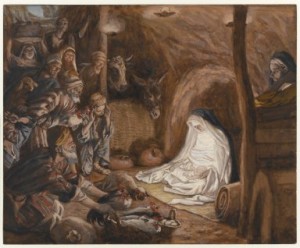
In fulfilment of this precept, Mary’s newborn child is given the name Jesus on the eighth day according to the Jewish custom. Joseph and Mary gave the name Jesus because that is the name given by God’s messenger before Jesus was conceived in Mary’s womb. This name signifies Jesus’ identity and his mission. The literal Hebrew means the Lord saves. Since God alone can forgive sins, it is God who, in Jesus his eternal Son made man will save his people from their sins (Matthew 1:21). In the birth and naming of this child we see the wondrous design and plan of God in giving us a Savior who would bring us grace, mercy, and freedom from the power of sin and the fear of death. The name Jesus signifies that the very name of God is present in the person of his Son who became man for our salvation. Peter the Apostle exclaimed that there is no other name under heaven given among mortals by which we must be saved (Acts 2:12). In the name of Jesus demons flee, cripples walk, the blind see, the deaf hear, and the dead are raised. His name is exalted far above every other name (Philippians 2:9-11). The name Jesus is at the heart of all Christian prayer. It is through and in Jesus that we pray to the Father in the power of the Holy Spirit. Many Christians have died with one word on the lips, the name of Jesus. Do you exalt the name of Jesus and pray with confidence in his name?
“Lord Jesus Christ, I exalt your name above every other name. For in you I have pardon, mercy, grace and victory over sin and death. You humbled yourself for my sake and for the sake of all sinners by sharing in our humanity and by dying on the cross. Help me to always praise your holy name and to live for your greater glory.”
for the full reflection visit : Daily Reading and Meditation
Tags: blessed virgin mary, catholic, catholic podcast, catholic prayer, cathollc spirituality, don schwager, gospel of luke, heaven, Jesus, joseph and mary, name of jesus, reflection, shepherds, solemnity of the blessed virgin mary
This entry was posted on Saturday, January 1st, 2011 at 12:05 am
You can follow any responses to this entry through the RSS 2.0 feed.
The Confessions of St. Augustine….click on this link
Tags: catholic, catholic podcast, catholic prayer, cathollc spirituality, st augustine, The Confessions of St. Augustine
This entry was posted on Saturday, January 1st, 2011 at 12:01 am
You can follow any responses to this entry through the RSS 2.0 feed.
Episode 9 -The Way of Mystery: The Eucharist and Moral Living–  The Liturgy of the Eucharist part 1 : The offertory and the priesthood…what is the role of the priest in the sacrifice of the Mass and what are some of the challenges faced by the priest today.
The Liturgy of the Eucharist part 1 : The offertory and the priesthood…what is the role of the priest in the sacrifice of the Mass and what are some of the challenges faced by the priest today.
[powerpress]
Deacon James Keating, PhD, the director of Theological Formation for the Institute for Priestly Formation, located at Creighton University, in Omaha, is making available to â€Discerning Hearts†and all who listen, his series of programs entitled “The Way of Mysteryâ€.
 The Vatican II documents remind us that the spiritual journey is not made in a vacuum, that God has chosen to save us, not individually, but as The People of God. The Eucharist must help Christians to make their choices by discerning out of Christ’s paschal mystery. For this process to take place, however, Christians must first understand how the Eucharist puts them in touch with Christ’s passion, death, and resurrection, and what concrete implications being in touch with this mystery has for their daily lives.
The Vatican II documents remind us that the spiritual journey is not made in a vacuum, that God has chosen to save us, not individually, but as The People of God. The Eucharist must help Christians to make their choices by discerning out of Christ’s paschal mystery. For this process to take place, however, Christians must first understand how the Eucharist puts them in touch with Christ’s passion, death, and resurrection, and what concrete implications being in touch with this mystery has for their daily lives.
For more information on the “Institute of Priestly Formation†and for other material available by Deacon Keating, just click here
Don’t forget to pickup a copy of “Communion with Christ†, it is one of the best audio sets on prayer…ever!
Check out Deacon Keating’s “Discerning Heart†page
Tags: catholic, catholic podcast, catholic prayer, cathollc spirituality, communion, creighton university, deacon, Deacon James Keating, discerning heart, institute for priestly formation, james keating, liturgy, paschal mystery, priesthood, sacrifice of the mass, spiritual journey, the eucharist, theological formation, vatican ii documents, way of mystery
This entry was posted on Thursday, December 30th, 2010 at 4:15 pm
You can follow any responses to this entry through the RSS 2.0 feed.
 Patroness of Artists and Against Spiritual Temptation
Patroness of Artists and Against Spiritual Temptation
VATICAN CITY, 29 DEC 2010 (vatican.va) –
Dear Brothers and Sisters,
In a recent Catechesis I spoke of St Catherine of Siena. Today I would like to present to you another less well known Saint who has the same name: St Catherine of Bologna, a very erudite yet very humble woman. She was dedicated to prayer but was always ready to serve; generous in sacrifice but full of joy in welcoming Christ with the Cross. Catherine was born in Bologna on 8 September 1413, the eldest child of Benvenuta Mammolini and John de’ Vigri, a rich and cultured patrician of Ferrara, a doctor in law and a public lector in Padua, where he carried out diplomatic missions for Nicholas III d’Este, Marquis of Ferrara.
Not much information about Catherine’s infancy and childhood is available and not all of it is reliable. As a child she lived in her grandparents’ house in Bologna, where she was brought up by relatives, especially by her mother who was a woman of deep faith. With her, Catherine moved to Ferrara when she was about 10 years old and entered the court of Nicholas III d’Este as lady-in-waiting to Margaret, Nicholas’ illegitimate daughter. The Marquis was transforming Ferrara into a fine city, summoning artists and scholars from various countries. He encouraged culture and, although his private life was not exemplary, took great care of the spiritual good, moral conduct and education of his subjects. In Ferrara Catherine was unaware of the negative aspects that are often part and parcel of court life. She enjoyed Margaret’s friendship and became her confidante. She developed her culture by studying music, painting and dancing; she learned to write poetry and literary compositions and to play the viola; she became expert in the art of miniature-painting and copying; she perfected her knowledge of Latin. In her future monastic life she was to put to good use the cultural and artistic heritage she had acquired in these years. She learned with ease, enthusiasm and tenacity. She showed great prudence, as well as an unusual modesty, grace and kindness in her behaviour. However, one absolutely clear trait distinguished her: her spirit, constantly focused on the things of Heaven. In 1427, when she was only 14 years old and subsequent to certain family events, Catherine decided to leave the court to join a group of young noble women who lived a community life dedicating themselves to God. Her mother trustingly consented in spite of having other plans for her daughter. We know nothing of Catherine’s spiritual path prior to this decision. Speaking in the third person, she states that she entered God’s service, “illumined by divine grace… with an upright conscience and great fervourâ€, attentive to holy prayer by night and by day, striving to acquire all the virtues she saw in others, “not out of envy but the better to please God in whom she had placed all her love†(Le sette armi necessarie alla battaglia spirituali, [The seven spiritual weapons], VII, 8, Bologna 1998, p. 12). She made considerable spiritual progress in this new phase of her life but her trials, her inner suffering and especially the temptations of the devil were great and terrible. She passed through a profound spiritual crisis and came to the brink of despair (cf. ibid., VII, 2, pp. 12-29). She lived in the night of the spirit, and was also deeply shaken by the temptation of disbelief in the Eucharist.
After so much suffering, the Lord comforted her: he gave her, in a vision, a clear awareness of the Real Presence in the Eucharist, an awareness so dazzling that Catherine was unable to express it in words (cf. ibid., VIII, 2. pp. 42-46).
In this same period a sorrowful trial afflicted the community: tension arose between those who wished to follow the Augustinian spirituality and those who had more of an inclination for Franciscan spirituality. Between 1429 and 1430, Lucia Mascheroni, in charge of the group, decided to found an Augustinian monastery. Catherine, on the other hand chose with others to bind herself to the Rule of St Clare of Assisi. It was a gift of Providence, because the community dwelled in the vicinity of the Church of the Holy Spirit, annexed to the convent of the Friars Minor who had adhered to the movement of the Observance. Thus Catherine and her companions could take part regularly in liturgical celebrations and receive adequate spiritual assistance. They also had the joy of listening to the preaching of St Bernardine of Siena (cf. ibid., VII, 62, p. 26). Catherine recounts that in 1429 — the third year since her conversion — she went to make her confession to one of the Friars Minor whom she esteemed, she made a good Confession and prayed the Lord intensely to grant her forgiveness for all her sins and the suffering connected with them.
In a vision God revealed to her that he had forgiven her everything. It was a very strong experience of divine mercy which left an indelible mark upon her, giving her a fresh impetus to respond generously to God’s immense love (cf. ibid. IX, 2, pp. 46-48).
In 1431 she had a vision of the Last Judgement. The terrifying spectacle of the damned impelled her to redouble her prayers and penance for the salvation of sinners. The devil continued to assail her and she entrusted herself ever more totally to the Lord and to the Virgin Mary (cf. ibid., X, 3, pp. 53-54). In her writings, Catherine has left us a few essential notes concerning this mysterious battle from which, with God’s grace, she emerged victorious. She did so in order to instruct her sisters and those who intend to set out on the path of perfection: she wanted to put them on their guard against the temptations of the devil who often conceals himself behind deceptive guises, later to sow doubts about faith, vocational uncertainty and sensuality. In her autobiographical and didactic treatise, The Seven Spiritual Weapons, Catherine offers in this regard teaching of deep wisdom and profound discernment. She speaks in the third person in reporting the extraordinary graces which the Lord gives to her and in the first person in confessing her sins. From her writing transpires the purity of her faith in God, her profound humility, the simplicity of her heart, her missionary zeal, her passion for the salvation of souls. She identifies seven weapons in the fight against evil, against the devil:
1. always to be careful and diligently strive to do good;
2. to believe that alone we will never be able to do something truly good;
3. to trust in God and, for love of him, never to fear in the battle against evil, either in the world or within ourselves;
4. to meditate often on the events and words of the life of Jesus, and especially on his Passion and his death;
5. to remember that we must die;
6. to focus our minds firmly on memory of the goods of Heaven;
7. to be familiar with Sacred Scripture, always cherishing it in our hearts so that it may give direction to all our thoughts and all our actions.
A splendid programme of spiritual life, today too, for each one of us!
In the convent Catherine, in spite of being accustomed to the court in Ferrara, served in the offices of laundress, dressmaker and breadmaker and even looked after the animals. She did everything, even the lowliest tasks, with love and ready obedience, offering her sisters a luminous witness. Indeed she saw disobedience as that spiritual pride which destroys every other virtue. Out of obedience she accepted the office of novice mistress, although she considered herself unfit for this office, and God continued to inspire her with his presence and his gifts: in fact she proved to be a wise and appreciated mistress. Later the service of the parlour was entrusted to her. She found it trying to have to interrupt her prayers frequently in order to respond to those who came to the monastery grill, but this time too the Lord did not fail to visit her and to be close to her. With her the monastery became an increasingly prayerful place of self-giving, of silence, of endeavour and of joy. Upon the death of the abbess, the superiors thought immediately of her, but Catherine urged them to turn to the Poor Clares of Mantua who were better instructed in the Constitutions and in religious observance. Nevertheless, a few years later, in 1456, she was asked at her monastery to open a new foundation in Bologna. Catherine would have preferred to end her days in Ferrara, but the Lord appeared to her and exhorted her to do God’s will by going to Bologna as abbess. She prepared herself for the new commitment with fasting, scourging and penance. She went to Bologna with 18 sisters. As superior she set the example in prayer and in service; she lived in deep humility and poverty. At the end of her three-year term as abbess she was glad to be replaced but after a year she was obliged to resume her office because the newly elected abbess became blind. Although she was suffering and and was afflicted with serious ailments that tormented her, she carried out her service with generosity and dedication. For another year she urged her sisters to an evangelical life, to patience and constancy in trial, to fraternal love, to union with the divine Bridegroom, Jesus, so as to prepare her dowry for the eternal nuptials. It was a dowry that Catherine saw as knowing how to share the sufferings of Christ, serenely facing hardship, apprehension, contempt and misunderstanding (cf. Le sette armi spirituali, X, 20, pp. 57-58). At the beginning of 1463 her health deteriorated. For the last time she gathered the sisters in Chapter, to announce her death to them and to recommend the observance of the Rule. Towards the end of February she was harrowed by terrible suffering that was never to leave her, yet despite her pain it was she who comforted her sisters, assuring them that she would also help them from Heaven. After receiving the last Sacraments, she give her confessor the text she had written: The Seven Spiritual Weapons, and entered her agony; her face grew beautiful and translucent; she still looked lovingly at those who surrounded her and died gently, repeating three times the name of Jesus. It was 9 March 1463 (cf. I. Bembo, Specchio di illuminazione, Vita di S. Caterina a Bologna,Florence 2001, chap. III). Catherine was to be canonized by Pope Clement XI on 22 May 1712. Her incorrupt body is preserved in the city of Bologna, in the chapel of the monastery of Corpus Domini. Dear friends, with her words and with her life, St Catherine of Bologna is a pressing invitation to let ourselves always be guided by God, to do his will daily, even if it often does not correspond with our plans, to trust in his Providence which never leaves us on our own. In this perspective, St Catherine speaks to us; from the distance of so many centuries she is still very modern and speaks to our lives.
She, like us, suffered temptations, she suffered the temptations of disbelief, of sensuality, of a difficult spiritual struggle. She felt forsaken by God, she found herself in the darkness of faith. Yet in all these situations she was always holding the Lord’s hand, she did not leave him, she did not abandon him. And walking hand in hand with the Lord, she walked on the right path and found the way of light.
So it is that she also tells us: take heart, even in the night of faith, even amidst our many doubts, do not let go of the Lord’s hand, walk hand in hand with him, believe in God’s goodness. This is how to follow the right path!
And I would like to stress another aspect: her great humility. She was a person who did not want to be someone or something; she did not care for appearances, she did not want to govern. She wanted to serve, to do God’s will, to be at the service of others. And for this very reason Catherine was credible in her authority, because she was able to see that for her authority meant, precisely, serving others.
Let us ask God, through the intercession of Our Saint, for the gift to achieve courageously and generously the project he has for us, so that he alone may be the firm rock on which our lives are built. Thank you.
Tags: Bologna, catholic, catholic podcast, catholic prayer, cathollc spirituality, evil, faith, franciscan spirituality, mystic of the Church, poor clares, pope benedict xvi, Saint Catherine, spiritual weapons, st catherine of bologna, suffering, temptations, women of the middle ages
This entry was posted on Thursday, December 30th, 2010 at 5:53 am
You can follow any responses to this entry through the RSS 2.0 feed.
Episode 4 – Regnum Novum: Bringing forth the New Evangelization through Catholic Social Teaching with Omar Guiterrez – Value 4 Truth, Freedom, Justice, and Love part 1 “Truth and Freedom”
– Value 4 Truth, Freedom, Justice, and Love part 1 “Truth and Freedom”
Discerning Hearts is blessed to present Omar F. A. Guiterrez, M.A. , Special Assistant to Archbishop George Lucas of the Archdiocese of Omaha, in a groundbreaking series which breaks open the heart of Catholic Social Doctrine.
We encourage you to visit “Regnum Novum – A New Kingdom: A Revolution” Omar Guiterrez’s blog site
 We live at a very special time. The confluence of many things has brought forth the clear need to be able to articulate the Social Teaching of the Catholic Church in a way that is accessible and applicable. This is not to be an effort where high-minded theories are to be bandied about. Rather, this is a time of opportunity wherein we can apply the Social Doctrine to the concrete so as to bring about a New Kingdom, a Revolution. – Omar G. from Regnum Novum
We live at a very special time. The confluence of many things has brought forth the clear need to be able to articulate the Social Teaching of the Catholic Church in a way that is accessible and applicable. This is not to be an effort where high-minded theories are to be bandied about. Rather, this is a time of opportunity wherein we can apply the Social Doctrine to the concrete so as to bring about a New Kingdom, a Revolution. – Omar G. from Regnum Novum
[powerpress]
From episode … 4. Truth, Freedom, Justice, and Love part 1 “Truth and Freedom”
These are the four values of the Social Teaching of the Catholic Church as they’re enumerated in the Compendium and as they were laid out by, again, Blessed Pope John XXIII in Mater et magistra and Pacem in terris. Without these values, the work of social justice becomes an albatross around our necks. It pulls us down, threatening to poison all the work we do, no matter how well intentioned.
When charity lacks truth, as Pope Benedict XVI states, it can be filled with every whim and agenda and becomes the opposite of itself. Truth is the truth of the fundamental dignity of the human person, a dignity we can only fully appreciate in the encounter with Christ.
A freedom that requires self-destruction is no freedom at all. Authentic freedom is the ability to do what is good, but this requires that we know the truth about the good.
(Justice and Love covered in proceeding episodes)
Also visit Omar’s “Discerning Hearts” page Catholic Social Teaching 101
Tags: catholic, catholic podcast, catholic prayer, catholic social doctrine, cathollc spirituality, dignity of the human person, freedom, pope benedict xvi, pope john xxiii, social teaching of the catholic church, truth
This entry was posted on Wednesday, December 29th, 2010 at 7:00 am
You can follow any responses to this entry through the RSS 2.0 feed.
“An angel of the Lord appeared to Joseph in a dream”
an excerpt from today’s reflection by Don Schwager: 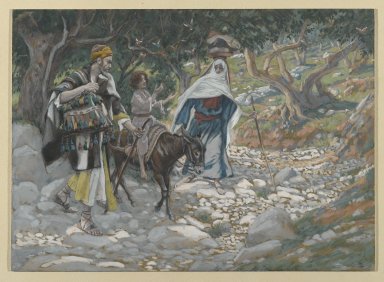
Like all godly parents, Joseph and Mary raised the child Jesus in the fear and wisdom of the Lord. Joseph was given a unique task as the guardian and protector of Mary and of Jesus. What can we learn from the example and witness of Joseph? Joseph is a man of God, a man of unquestioning obedience and willing service. He is a man of prayer and a man of God’s word. Through faith he recognized the hand of God in the mystery of the Incarnation — the Son of God taking flesh as the son of Mary. Joseph is a man of action, diligent in the care of his family and ready to do the Lord’s bidding. Joseph fearlessly set aside his own plans when God called him to “take to the road” and to leave his familiar surroundings — his home, friends and relatives, and the security of his livelihood in order to pursue a hidden mission God entrusted to him as the guardian of the newborn King. God has a plan for each of us. With the plan God gives grace and the assurance of his guiding hand and care. Do you trust Him for his plan for your life? Are you willing to sacrifice your own plans for God’s plan? Are you willing to give God unquestioning service and to pursue whatever mission he gives you?
“Lord, make me a faithful servant of your word and guardian of your truth. Help me to obey you willingly, like Joseph and Mary, with unquestioning trust and with joyful hope.”
for the full reflection visit : Daily Reading and Meditation
Tags: angel of the lord, catholic, catholic podcast, catholic prayer, cathollc spirituality, don schwager, dreams, flight ot eygpt, gospel of matthew, holy family, jesus mary joseph, joseph and mary, return from eygpt
This entry was posted on Sunday, December 26th, 2010 at 11:22 am
You can follow any responses to this entry through the RSS 2.0 feed.
“Recalling with great fondness my four-day visit to the United Kingdom last September, I am glad to have the opportunity to greet you once again, and indeed to greet listeners everywhere as we prepare to celebrate the birth of Christ. Our thoughts turn back to a moment in history when God’s chosen people, the children of Israel, were living in intense expectation. They were waiting for the Messiah that God had promised to send, and they pictured him as a great leader who would rescue them from foreign domination and restore their freedom.”
“God is always faithful to his promises, but he often surprises us in the way he fulfils them.â€
“God is always faithful to his promises, but he often surprises us in the way he fulfils them. The child that was born in Bethlehem did indeed bring liberation, but not only for the people of that time and place – he was to be the Saviour of all people throughout the world and throughout history. And it was not a political liberation that he brought, achieved through military means: rather, Christ destroyed death for ever and restored life by means of his shameful death on the Cross. And while he was born in poverty and obscurity, far from the centres of earthly power, he was none other than the Son of God. Out of love for us he took upon himself our human condition, our fragility, our vulnerability, and he opened up for us the path that leads to the fullness of life, to a share in the life of God himself. As we ponder this great mystery in our hearts this Christmas, let us give thanks to God for his goodness to us, and let us joyfully proclaim to those around us the good news that God offers us freedom from whatever weighs us down: he gives us hope, he brings us life.
Dear Friends from Scotland, England, Wales and indeed every part of the English-speaking world, I want you to know that I keep all of you very much in my prayers during this Holy Season. I pray for your families, for your children, for those who are sick, and for those who are going through any form of hardship at this time. I pray especially for the elderly and for those who are approaching the end of their days. I ask Christ, the light of the nations, to dispel whatever darkness there may be in your lives and to grant to every one of you the grace of a peaceful joyful Christmas. May God bless all of you!” –BBC4
Tags: birth of christ, catholic, catholic podcast, catholic prayer, cathollc spirituality, faithful to his promises, pope benedict xvi
This entry was posted on Sunday, December 26th, 2010 at 9:20 am
You can follow any responses to this entry through the RSS 2.0 feed.

